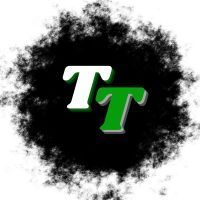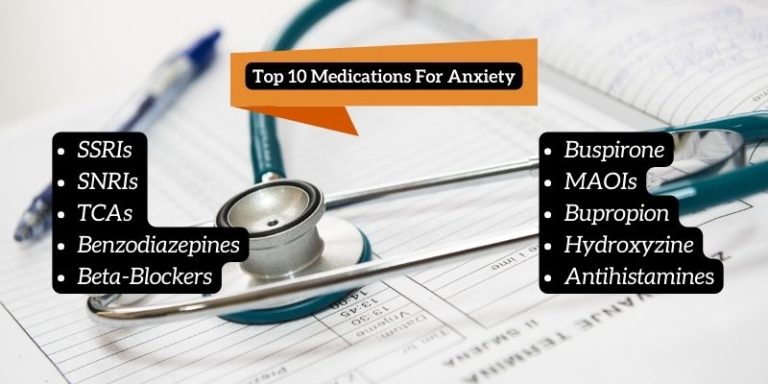Top 10 Sleeping Pills – Best Effective Sleep Medications In 2024
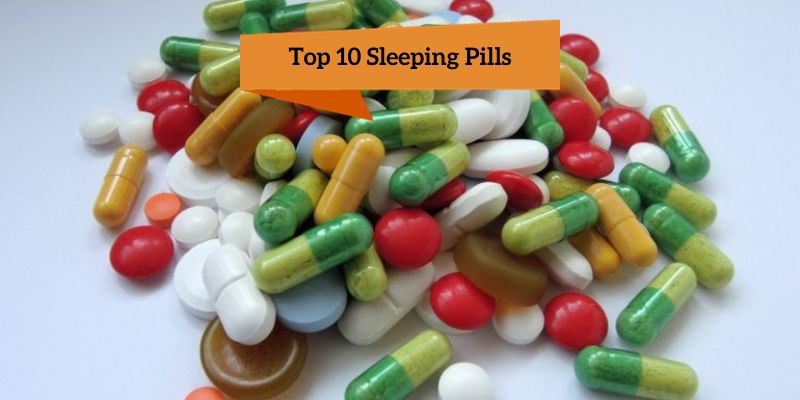
Let’s talk about the top 10 sleeping pills as of 2024. Insomnia, characterized by difficulty falling or staying asleep, affects numerous individuals worldwide. In the pursuit of a good night’s rest, various strongest sleeping pills have emerged as potential aids. From Ambien to Lunesta, these best prescription sleep medicines offer solutions aimed at addressing sleep disorders.
This article delves into the realm of sleep aids. It presents a comprehensive guide to the top 10 best sleeping pills available today. Exploring the insomnia medication mechanisms, benefits, and potential side effects. This guide aims to shed light on sleep medications to empower individuals to make informed choices for a better night’s sleep.
Top 10 Sleeping Pills (Best Effective Sleep Medications In 2024)
| Strong sleeping pills names | Active Ingredient | Usage | Common Side Effects |
| Ambien | Zolpidem | Treats insomnia by helping you fall asleep faster | Drowsiness, dizziness, headache |
| Lunesta | Eszopiclone | Aids in falling asleep and staying asleep longer | Bitter taste, dry mouth, headache |
| Sonata | Zaleplon | Helps initiate sleep but has a shorter duration | Dizziness, headache, drowsiness |
| Rozerem | Ramelteon | Regulates sleep-wake cycle, particularly for difficulty falling asleep | Dizziness, fatigue, headache |
| Halcion | Triazolam | Short-term treatment for insomnia | Dizziness, drowsiness, headache |
| Restoril | Temazepam | Helps with falling asleep and staying asleep | Drowsiness, dizziness, dry mouth |
| Silenor | Doxepin | Assists in maintaining sleep throughout the night | Drowsiness, fatigue, dry mouth |
| Belsomra | Suvorexant | Targets the wake-promoting system to aid sleep | Drowsiness, headache, dizziness |
| Trazodone | Trazodone | Sometimes used off-label to treat insomnia | Drowsiness, dry mouth, blurred vision |
| Doxepin | Doxepin | Also used for sleep maintenance | Drowsiness, dry mouth, fatigue |
1. Ambien – Best sleeping tablet
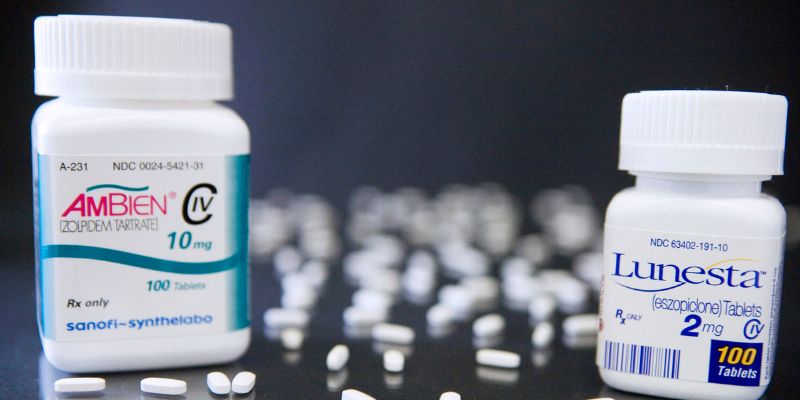
The Ambien best insomnia medication, containing the active ingredient Zolpidem. It is a widely prescribed medication used to alleviate insomnia by enhancing the effects of GABA, a neurotransmitter that calms the brain. This sleep aid is renowned for its ability to facilitate faster sleep onset, enabling individuals to attain a restful night.
However, Ambien may induce side effects like drowsiness, dizziness, and headaches. As a short-term solution for sleep disturbances, Ambien has garnered popularity but requires careful consideration and medical consultation due to potential risks associated with its usage.
Read Also: Top 10 cheapest car insurance companies
2. Lunesta

The best sleeping pill Lunesta, formulated with Eszopiclone as its active ingredient. It is a prescription sleep aid primarily prescribed for insomnia. It operates by influencing certain brain chemicals to facilitate the initiation and maintenance of sleep, offering relief to individuals struggling with sleep disturbances.
While effective in aiding both sleep onset and continuity, Lunesta might bring about side effects such as a bitter taste, dry mouth, and occasional headaches. As with any sleep medication, consulting a healthcare professional is essential to discuss its suitability, potential benefits, and risks before considering its usage for managing sleep issues.
3. Sonata
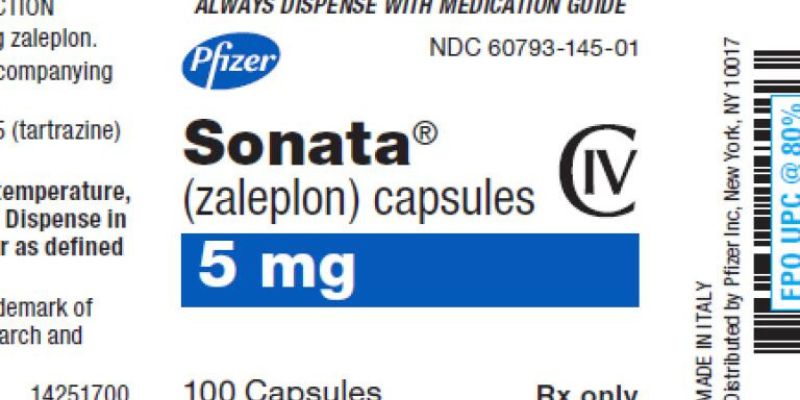
The sleeping medication Sonata, containing Zaleplon as its active component. It is a short-acting prescription sleep aid used to assist in initiating sleep. Unlike some other sleep medications, Sonata has a shorter duration of action, making it useful for individuals who have trouble falling asleep but do not require prolonged sleep support.
However, side effects such as dizziness, headaches, and drowsiness might occur. Due to its rapid onset and shorter duration, Sonata can be an option for those seeking immediate relief for sleep initiation issues. Still, it’s essential to consult a healthcare professional for guidance and to understand its potential effects and limitations.
4. Rozerem
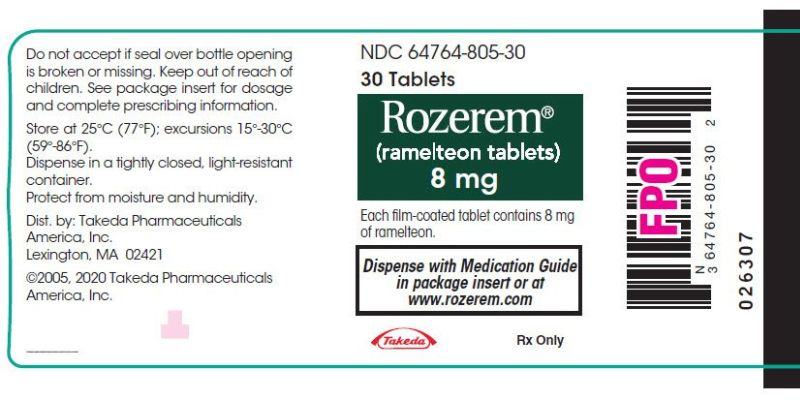
The sleeping medication Rozerem, containing Ramelteon as its active ingredient. It stands out among sleep aids by regulating sleep-wake cycles, which is particularly helpful for those facing difficulty initiating sleep. Unlike some traditional sleep medications, Rozerem works by targeting melatonin receptors, aligning the body’s natural sleep-wake rhythm.
While effective in aiding sleep onset, it may cause side effects like dizziness, fatigue, and occasional headaches. Rozerem’s unique mechanism provides an alternative for individuals seeking a non-habit-forming solution to sleep disturbances. However, consulting a healthcare professional is advised to determine its suitability and potential impact on individual sleep patterns.
5. Halcion
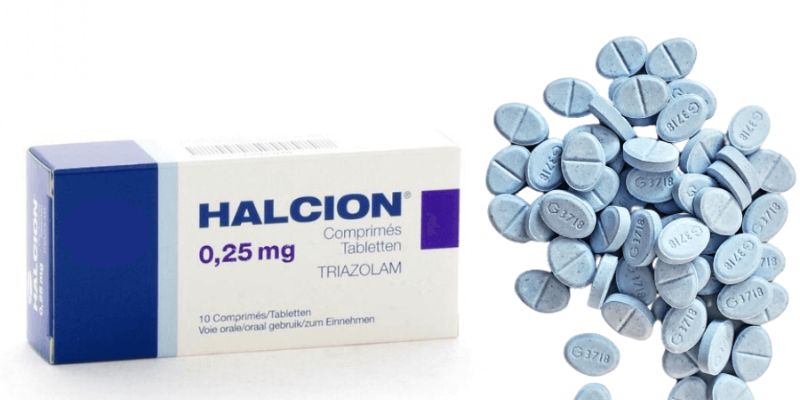
The sleeping pill Halcion, containing Triazolam as its active ingredient. It is a potent short-acting prescription sleep medication primarily used for short-term treatment of insomnia. It acts quickly to induce sleep but is recommended for brief durations due to its potential for habituation.
While effective in aiding sleep onset, Halcion may bring about side effects such as dizziness, drowsiness, and occasional headaches. Due to its potency and quick action, Halcion can be beneficial for immediate relief from sleep disturbances. Still, caution is advised, and it should be used strictly under healthcare professional guidance to minimize risks associated with its usage.
6. Restoril
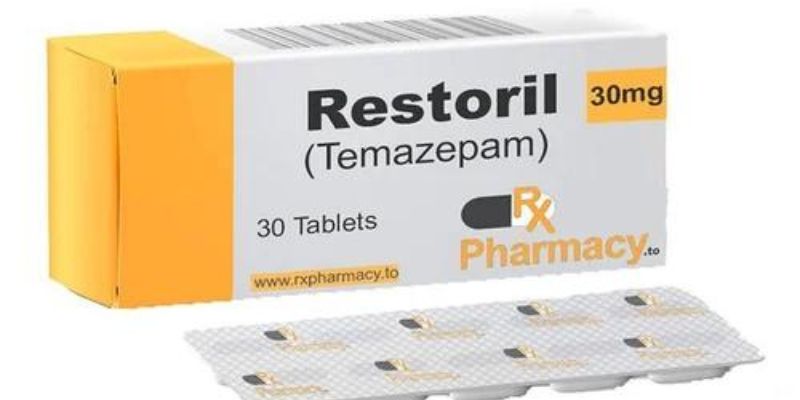
The sleep tablet Restoril, containing Temazepam as its active ingredient. It is a prescription sleep aid utilized to address both difficulty falling asleep and staying asleep. It belongs to the benzodiazepine class of medications, acting on the brain to induce relaxation and facilitate sleep.
While effective in promoting sleep continuity, Restoril might cause side effects such as drowsiness, dizziness, and occasional dry mouth. As a short-term solution for sleep disturbances, Restoril can be beneficial. Still, its usage requires careful consideration and consultation with a healthcare professional due to the potential risks and considerations associated with benzodiazepines.
7. Silenor
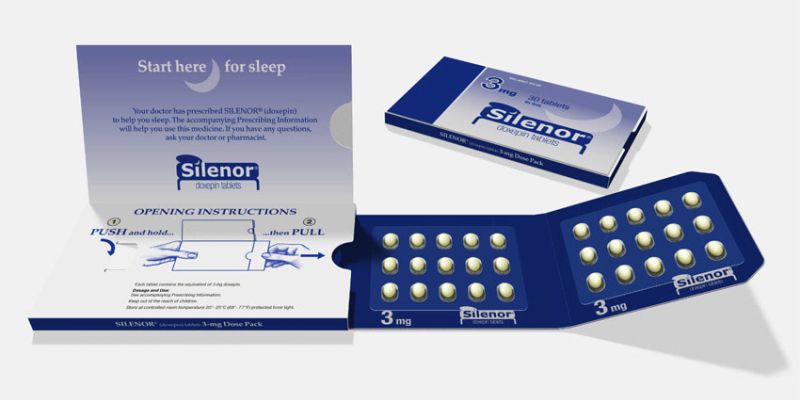
The Silenor, containing Doxepin as its active ingredient, is a prescription sleep aid primarily used to assist in maintaining sleep throughout the night. It works by affecting certain neurotransmitters in the brain to promote sleep. Silenor is specifically formulated to target sleep maintenance, aiding individuals who experience frequent awakenings during the night.
Side effects include drowsiness, fatigue, and occasional dry mouth. As a medication focused on enhancing sleep continuity, Silenor can be beneficial for individuals facing difficulties in staying asleep. However, consulting a healthcare professional is important to determine its suitability and potential impact on individual sleep patterns.
8. Belsomra
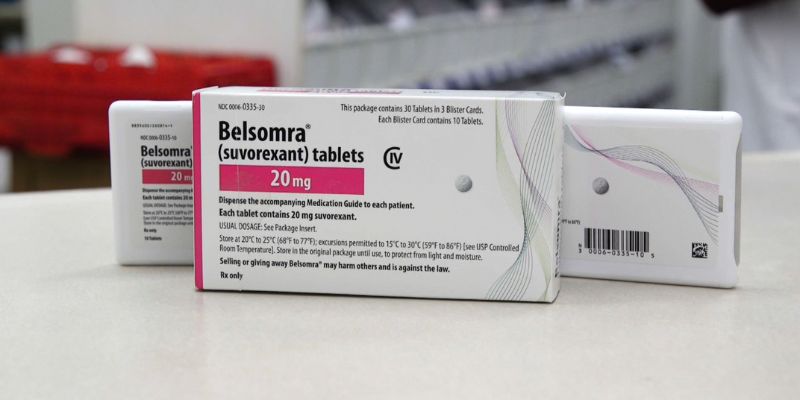
The Belsomra, containing Suvorexant as its active ingredient, differs from traditional sleep aids by targeting the brain’s wake-promoting system to improve sleep. This prescription medication helps regulate sleep by inhibiting orexin, a neurotransmitter that promotes wakefulness.
Belsomra is designed to aid sleep onset and maintenance, potentially causing side effects like drowsiness, headaches, and occasional dizziness. Its unique mechanism offers an alternative for individuals seeking non-habit-forming solutions to sleep disturbances. However, consulting a healthcare professional is essential to discuss its suitability and potential effects before considering Belsomra for managing sleep issues.”
9. Trazodone

The Trazodone, a medication not primarily intended as a sleep aid, is sometimes prescribed off-label for insomnia due to its soothing effects. It belongs to the class of antidepressants, working by altering neurotransmitters in the brain. Trazodone may assist in sleep initiation but might lead to side effects like drowsiness, dry mouth, and occasional blurred vision.
Despite its off-label use for sleep, caution is advised, and consulting a healthcare professional is crucial due to potential individual reactions, interactions, and the need to consider its primary purpose in treating depression while addressing sleep issues.
10. Doxepin
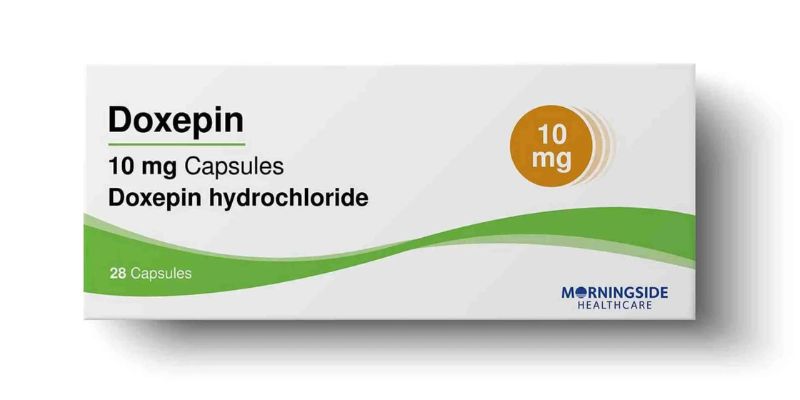
The Doxepin, a medication prescribed for various conditions, including depression and anxiety, is also utilized in lower doses as a sleep aid. It works by affecting neurotransmitters in the brain, primarily used to assist in sleep maintenance throughout the night. Doxepin aids individuals experiencing sleep disturbances by reducing nighttime awakenings.
Side effects include drowsiness, dry mouth, and occasional fatigue. Despite its effectiveness in promoting sleep continuity, consulting a healthcare professional is crucial due to individual responses, potential interactions, and considering its primary use for treating other conditions while addressing sleep-related concerns.
FAQs
No, always use light dose of any sleeping pill.
Belsomra is new brand to fall asleep fastly.
